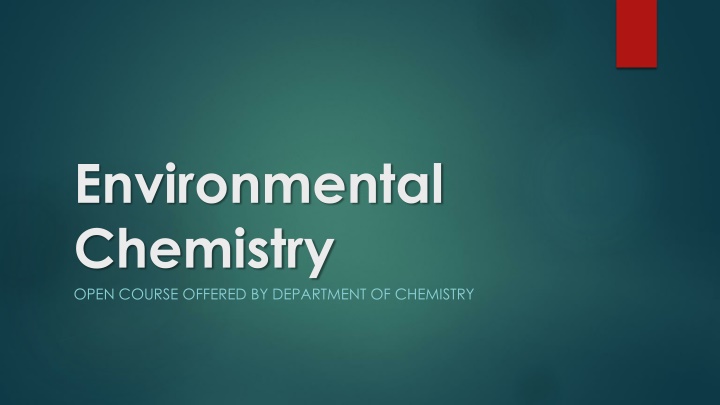
Comprehensive Environmental Chemistry Open Course Overview
This open course offered by the Department of Chemistry covers various aspects of environmental chemistry, including pollution terminology, causes and effects of air and water pollution, pollution control measures, and the basics of green chemistry. It includes modules on environmental segments, air pollution, water pollution, and soil, noise, thermal, light, and radioactive pollutions. Students will learn about different types of pollutants, sources of pollution, water quality parameters, toxic metals in water, and international standards for drinking water. The course aims to provide a holistic understanding of environmental issues and their solutions.
Download Presentation

Please find below an Image/Link to download the presentation.
The content on the website is provided AS IS for your information and personal use only. It may not be sold, licensed, or shared on other websites without obtaining consent from the author. If you encounter any issues during the download, it is possible that the publisher has removed the file from their server.
You are allowed to download the files provided on this website for personal or commercial use, subject to the condition that they are used lawfully. All files are the property of their respective owners.
The content on the website is provided AS IS for your information and personal use only. It may not be sold, licensed, or shared on other websites without obtaining consent from the author.
E N D
Presentation Transcript
Environmental Chemistry OPEN COURSE OFFERED BY DEPARTMENT OF CHEMISTRY
Course outcomes At the end of the course, students will be able to: Recall the technical/scientific terms involved in pollution. Understand the causes and effects of air pollution. Understand the sources, types and effects of water pollution. Describe water quality parameters. Know soil, noise, thermal and radioactive pollutions and their effects. Study various pollution control measures. Understand the basics of green chemistry.
Module I: Introduction to Environment and Environmental pollution (4 hrs) Environmental chemistry - introduction, Environmental segments Lithosphere: components of soils, Hydrosphere: water resources, Biosphere, Atmosphere - regions of atmosphere Troposphere, stratosphere, mesosphere, thermosphere. Environmental pollution Concepts and definition Pollutant, contaminant, receptor and sink Classification of pollutants Global, regional, local, persistent and non- persistent pollutants.
Module II: Air Pollution (8 hrs) Tropospheric pollution Gaseous air pollutants Hydrocarbons, oxides of sulphur, nitrogen and carbon Global warming, green house effect, acid rain Particulates Smog: London smog and photochemical smog effects and control of photochemical smog stratospheric pollution - depletion of ozone layer, chlorofluorocarbons - Automobile pollution. Control of air pollution Alternate refrigerants Bhopal Tragedy (a brief study). Air pollution in Indian cities (Delhi, Agra and Kanpur).
Module III: Water Pollution (10 hrs) Impurities in water cause of pollution natural and anthropogenic Marine water pollution Underground water pollution. Source of water pollution Industrial waste, Municipal waste, Agricultural waste, Radioactive waste, Petroleum, Pharmaceutical, heavy metal, pesticides, soaps and detergents. Types of water pollutants: Biological agents, physical agents and chemical agents Eutrophication - biomagnification and bioaccumulation. Water quality parameters: DO, BOD, COD, alkalianity, hardness, chloride, fluoride and nitrate. Toxic metals in water and their effects: Cadmium, lead and mercury Minamata disaster (a brief study), itai-itai disease, oil pollution in water. International standards for drinking water.
Module IV: Soil, Noise, Thermal, light and Radioactive Pollutions (8 hrs) Soil pollution: Sources by industrial and urban wastes. Pollution due to plastics, pesticides, biomedical waste and e-waste (source, effects and control measures) Control of soil pollution - Solid waste Management Open dumping, landfilling, incineration, re-use, reclamation, recycle, composting. Non-degradable, degradable and biodegradable wastes. Hazardous waste. Noise Pollution physiological response to noise, Noise categories - effect of noise biological effects. Thermal pollution definition, sources, harmful effects and prevention. Light pollution. Radioactive pollution (source, effects and control measures) Hiroshima, Nagasaki and Chernobyl accidents (brief study). Endosulfan disaster in Kerala (brief study).
Module V: Pollution Control Measures (12 hrs) Air pollution control measures Gravitational settling chamber, fabric filter, wet scrubber, catalytic converters, stacks and chimneys, cyclone collectors, Cottrell electrostatic precipitator, extraction ventilator, zoning and green belt.
Module VI: Green Chemistry (6 hrs) Introduction- Definition of green Chemistry need of green chemistry basic principles of green chemistry Applications of green chemistry in daily life.
